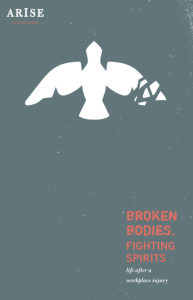By Arise Chicago
Maria Escutia, 36, of Park City, Illinois, could not get out of bed to care for her two children after being injured on the job. Two years after her workplace injury, her back pain was so severe she was not able to sleep through the night. The pain pulsed and burned all day long and traveled down her leg, causing tingling and frequent numbness. “Every day I was in pain and more irritable. It made it difficult to do everyday things – like helping my kids with their homework. It was endlessly frustrating. My family suffered the consequences of my workplace injury, but my employer didn’t.”
Escutia was a supervisor at a fast food chain for more than 15 years and never thought she would get hurt on the job. Once she reported the injury to her supervisors, the insurance company tried to deny her claim by alleging the injury did not occur in the workplace.
Sadly, Escutia’s experience is not unique. As James Ellenberger notes in a 2012 report, “Introduced as a no-fault program to provide medical benefits and wage replacement in the place of the uncertainty of tort recovery, workers’ comp has seen massive efforts to shift both the blame and the burden of workplace injuries and illnesses to the backs of workers.”

Says Escuita: “I was so afraid! I knew from my co-workers that employees had been injured at other locations before and the company looked for any pretext or excuse to fire them.”
Practices like these make it likely that workers, particularly low-wage, immigrant workers, are less likely to report an injury once it occurs. According to a U.S. House Committee on Education and Labor report from 2008, “As much as 69 percent of injuries and illnesses may never make it into the Survey of Occupational Injuries and Illnesses.” The report goes on to note that many workers fear retaliation or intimidation for reporting and injury to their employer.
In a 2010 UIC study of low-wage workers in Chicago, researchers found similarly low reporting rates. Of the workers surveyed who experienced a serious workplace injury, only 9% filed a workers’ comp claim. When workers told their employer about an injury, 20% experienced an illegal employer reaction. While workplace injury expenses are an employer’s legal responsibility, nearly half of surveyed injured workers had to pay their own bills (41%) or use their own health insurance (8%) to cover injury medical expenses. Workers’ compensation insurance paid all or part of medical expenses for only 3% of the injured workers surveyed.
Despite this rampant underreporting, data show that workplace hazards are present in all industries and cause thousands of injuries every year, ranging from minor burns, cuts, or fractures to lifelong major disabilities and even death. However, certain industries are more dangerous, and some workers are more likely to be injured.
Temporary workers are much more likely to become injured on the job, with incidence rates between 36 percent and 72 percent higher than other industries. Latino workers had the highest rate of fatal workplace incidents than any other racial group.
Honoria Pimentel went to a temp agency to find work in 2015. She was placed in a factory and was not properly trained on how to operate the machine at her station, nor provided adequate protective gear. Within the first few days of work, she injured her ankle. She reported it to the site supervisor and was referred to company clinic for an assessment, where they instructed her to remain out of work for a few days. When she returned, she was assigned to a new area that was severely understaffed. She performed the work of two workers alone and, once again, without proper training. She was injured for the second time in one week and has been in recovery ever since.
Her employer’s workers’ compensation insurance company spent years denying her claims. Pimentel sadly notes, “Employers treat you like you are disposable. If a machine is damaged they fix it quickly, but what they do with a human is replace you with another person.”
Pimentel recently underwent a surgery and continues physical therapy exercises, but still suffers from constant pain and is unable to return to work. “What else?” Pimentel says. “All we have left is to continue living with the pain.”
The outlook for workers like Escutia and Pimentel is grim: Recent studies show that workers who are injured on the job have long-term income losses even after they have recovered, and face increased mortality over the course of their lifetime. Qualitative data highlight the extreme effects workplace injuries have on an injured workers’ physical health, mental health, economic health, and family well-being.
Workers like Escutia and Pimentel, who struggle with ongoing pain and long-term impacts, exemplify these findings. Yet they also decided to take action to prevent other workers from being victimized by dehumanizing workplace practices. As Escutia notes, “My motivation in all this nightmare is my children and my parents; they are my engine and my light to continue trying hard.”
Workers like Escutia and Pimentel are increasingly seeking support from local worker centers to learn their rights and to connect with others struggling through the workers’ comp process. Escutia notes, “When I arrived [at Arise Chicago], my eyes were covered because the only thing I knew was what my boss wanted me to know. Now I feel more confident knowing my rights.”
Due to an observed trend in injured workers reporting additional non-physical long-term impacts, Arise Chicago launched a pilot project for injured workers. “We wanted to know, why is it that if you are injured at work, you are doomed to face long-term problems – from your physical health, to your mental health and well-being, and long-term economic challenges?” says Carolyn Morales, an organizer for Arise Chicago. “Why does a workplace injury lead to complete turmoil for so many workers? We created an Injured Workers Group to explore these questions, learn from workers’ experiences, and based on their recommendations, work to improve the system for other workers.”

After meeting over the course of many weeks, workers published a booklet of their reflections in the hope that others can learn from their experiences and that their stories will lead to safer, more humane working conditions for all workers.
Debbie Berkowitz, a senior fellow at the National Employment Law Project, writes in a recent report, “The evidence is clear that safety pays: safe workplaces save employers money, prevent injuries, and contribute to a more robust economy. It is estimated that workplace injuries cost the economy more than $198 billion annually. Yet, study after study clearly show that when employers provide safe equipment and implement basic safety measures, they save money.”
It is time for employers and regulatory agencies to take the physical safety of workers’ bodies seriously. Because the impacts of workplace injuries are severe, comprehensive, and long-lasting, safe workplaces not only protect individual bodies, they also leads to greater well-being for entire families and communities.
“Now I understand that the most important thing is my health, my body,” Escuita says. “There are many jobs, but I only have one body and I have to take care of it.” Like all workers who suffer a workplace injury, Escutia values her physical health and safety. It’s time for employers to do so as well.
–
Previously in workers’ comp:
* How To Investigate Workers’ Comp In Your State.
* Injured Worker In ProPublica/NPR Story Testifies Before Illinois Legislature.
* State Legislators To Investigate Workers’ Comp Opt Out.
* Tyson Foods’ Secret Recipe For Carving Up Workers’ Comp.
* The Workers’ Comp Industrial Complex Parties Hearty.
* Corporate Campaign To Ditch Workers’ Comp Stalls.
* U.S. Labor Department: States Are Failing Injured Workers.
–
Previously from Arise Chicago:
* After Receiving Only Tips For Years And Losing Thumb At Work Accident, Latino Car Wash Worker Demands Back Wages.
* The Patisserie Protest.
* Item: Clean Cars, Dirty Work: Worker Rights Violations In Chicago Car Washes.
* Riviera Stagehands To “Trick-or-Treat” For Union Contract At JAM Productions.
* Low-Wage Immigrant Women Call Out Workplace Sexual Harassment.
–
Comments welcome.
Posted on December 21, 2017


